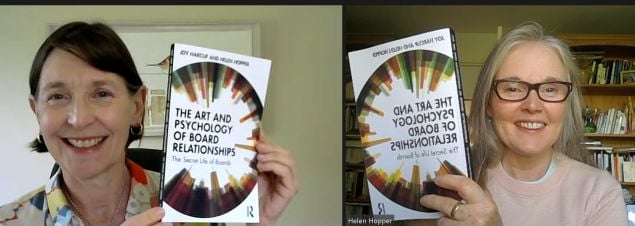46. The Secret Life of Boards
In this episode we discuss board relationships and emotional intelligence. We are joined by Helen Hopper and Joy Harcup, authors of The Art and Psychology of Board Relationships: The Secret Life of Boards.


We chat about the following:
Unravelling Boardroom Dynamics: What's Really at Stake?
The Power of Psychological Safety: A Boardroom Imperative?
Self-Awareness: The Boardroom Game Changer?
Mastering Conflict Resolution in the Boardroom: Strategies Unveiled
Trust, Collaboration, Success: The Boardroom Trifecta?
References:
Biography:
HELEN HOPPER trained in management consultancy with Accenture, and in occupational psychology with SHL, before co-founding the leadership consulting firm hCubed in 2010, where she is a Partner. h3’s mission is to stimulate growth through learning and Helen pursues this with individuals, teams and organisations as a coach and facilitator. She is an active supporter of mental health charities, most recently as COO of The Listening Place, and Trustee at The Mix.
JOY HARCUP is an executive coach with international coaching firm Praesta LLP, working with individuals, top executive teams and boards. She has 20 years’ leadership coaching experience with clients including the FTSE 100, professional services, public and not-for-profit sectors. Joy was President of the UK Board of the International Coaching Federation. A former lawyer specialising in dispute resolution, she’s also sat on boards in the education and charitable sectors.
To learn more about Beth and Brandon or to find out about sponsorship opportunities click here.
Summary:
Bullying in board meetings and its impact on individuals. 0:06
Bethany Ayers experienced issues with her phone number porting and international roaming, leading to a frustrating conversation with Oh Two customer support.
Despite being told her case was closed, Bethany was able to get her number back after waiting for a couple of days.
Bethany acknowledges being a potential bully in the past, recognizing behaviors that could be harmful to others.
Brandon M. questions the use of the term "bullying," suggesting that it can be subjective and context-dependent.
Effective board meetings, leadership, and conflict resolution. 5:18
Brandon M. and Bethany discuss ways to address unhelpful behavior in meetings, including intervening, redirecting, and parking the issue for later discussion.
Effective chairperson engagement is critical for maintaining a functional board, according to Brandon M. and Bethany.
Bethany emphasizes the importance of having a pre-agreed contract, such as a team canvas, to establish expectations and prevent conflicts within teams.
Bethany criticizes traditional board dynamics, citing a lack of modernization and unrealistic expectations of chairs, and argues for more inclusive and empathetic approaches to leadership.
Effective board meetings, including setting a strong chair, providing clear agendas, and making an ask of the board. 10:36
Brandon M suggests setting a strong chair, creating a safe environment, and starting the meeting with positivity.
Bethany shares her personal experience with self-reflection and realizing she may be projecting her own issues onto others.
Bethany and Brandon discuss the importance of formalizing asks and understanding board dynamics.
Boardroom dynamics, bullying, and effective leadership. 14:40
Helen and Beth discuss the importance of self-awareness in boardroom dynamics, identifying seven difficult dynamics and providing questions for individuals to reflect on their contribution.
The book "The Art and Psychology of Boardroom Relationship Dynamics" offers practical strategies for improving relationships, including getting clear on roles and agreements, and using the "tears tactic" to resolve conflicts.
Helen suggests dealing with bullying by understanding it's often unintentional and lacking awareness of impact.
Brandon M. shares a scenario where exiting board members was the fastest way to address toxic dynamics.
Helen emphasizes the importance of self-awareness and empathy in avoiding bullying dynamics.
Joy stresses the value of authentic leadership and role modeling in creating a productive board culture.
Leadership roles and responsibilities in a board setting. 22:43
Bethany struggles with power dynamics in a growing team, feeling like she's overstepping or under-utilizing her skills.
Joy's research highlights the importance of working at the right level of work to avoid losing opportunities.
Joy: Facilitate conversations, surface concerns, and make decisions (Joy)
Bethany: Share knowledge from other boards, have one-on-one with chair (Bethany)
Board dynamics, psychological safety, and effective communication. 27:23
Helen suggests conducting a board evaluation every 3 years to identify areas for improvement.
Joy emphasizes the importance of transparency and openness in board dynamics.
Helen and Joy share insights on creating psychological safety in board meetings, inviting contributions, and addressing conflicts.
They emphasize the importance of open communication, active listening, and taking small steps towards change.
Love The Operations Room? Please like and review it here - RateThisPodcast.com/operationsroom
